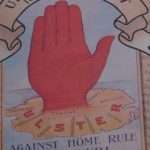Running for the border
An easy drive to Belfast to watch Ulster defeat ASM Clermont Auvergne 39-32 in the European Rugby Cup. Driving south toward the border in the early evening darkness the tail lights of the car ahead were a reminder of Bruce Springsteen’s song “Highway Patrolman.”
The conclusion of “Highway Patrolman'” is made possible through the line on a map, the border between the United States and Canada:
Well, the night was like any other, I got a call `bout quarter to nine
There was trouble in a roadhouse out on the Michigan line
There was a kid lyin’ on the floor lookin’ bad bleedin’ hard from his head
There was a girl cry’n’ at a table and it was Frank, they saidWell, I went out and I jumped in my car and I hit the lights
Well, I musta done one hundred and ten through Michigan county that night
It was out at the crossroads, down `round Willow bank
Seen a Buick with Ohio plates; behind the wheel was FrankWell, I chased him through them county roads
Till a sign said “Canadian border five miles from here”
I pulled over the side of the highway and watched his tail-lights disappear.
Borders are strange an arbitrary things, defying rational explanation. Used to living on this small island where politics on one side of the border was defined by a sectarian head count, while that on the other arose from a short and nasty civil war, there was always a sense that while there might be a political boundary, other ties were such that the line on the map could never be absolute. The churches never acknowledged the border in diocesan or parochial organization; like rugby, most of the sporting organizations remained all-Ireland bodies; even banks and businesses were cross border entities.
Ireland’s border was never the international frontier of Springsteen’s “Highway Patrolman”, nor was it ever comparable to the cultural borders drawn along random lines in Europe. Staying in 2009 just south of the Belgian border, we drove the few miles to Ypres to attend the nightly ceremony at the Menin Gate commemorating soldiers who had died in Flanders. Speaking no Flemish and not wishing to give offence, I tried to buy fish and chips in the town square by speaking French, the woman at the counter snapped at me, ‘I am not French and you are not French, you will speak English, please’.
Crossing a line drawn on a map where on one side one language is spoken, and on the other a language entirely different, is strange; what rational explanation is there for such borders? Until 1914, it was possible to travel through Europe without even a passport; the requirement for the passport may have disappeared from most of the lines on the map, but the borders in the mind are still very firm, and are deepening with the burgeoning support for the radical Right. Frank driving for the Canadian border was likely to cross a frontier far less enduring than those within our supposed Union, though much more enduring than that crossed by two Leinster fans going to support Ulster.



Comments
Running for the border — No Comments
HTML tags allowed in your comment: <a href="" title=""> <abbr title=""> <acronym title=""> <b> <blockquote cite=""> <cite> <code> <del datetime=""> <em> <i> <q cite=""> <s> <strike> <strong>